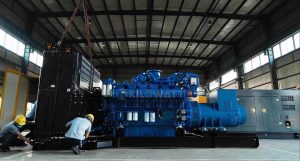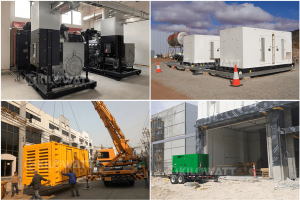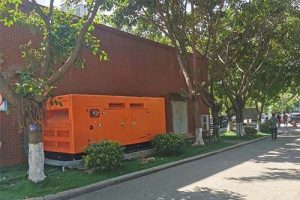Diesel standby generators are essential in the fast-paced world of business, where power outages can be disastrous, causing significant financial losses, disrupting operations, and damaging equipment. Ensuring an uninterrupted power supply is crucial, and these generators provide a reliable solution. Known for their robust performance, fuel efficiency, and low maintenance, diesel standby generators are indispensable for businesses.
1: Understanding Diesel Standby Generators
Definition and Function:
-
What is a diesel standby generator?
A diesel standby generator is a backup power system designed to automatically provide electricity during a power outage. It operates using a diesel engine to generate electrical energy, ensuring that critical business operations continue without interruption. These generators are vital for maintaining power in facilities where continuous electricity is essential.

-
How does it work to provide uninterrupted power?
When the main power supply fails, the diesel standby generator detects the outage through its automatic transfer switch (ATS). The ATS swiftly activates the generator, which starts up and begins supplying power within seconds. This seamless transition ensures that there is no downtime in operations. The generator continues to run until the main power supply is restored, at which point the ATS switches back to the primary power source, and the generator shuts down. This automated process ensures a reliable and uninterrupted power supply, safeguarding business operations from the adverse effects of power outages.
Types and Uses of Diesel Standby Generators:
- Open Type Standby Generators: These generators are commonly used in industrial settings where noise levels are not a primary concern. They are designed for easy access and maintenance, making them suitable for locations where operational noise can be tolerated.
- Silent Type Standby Generators: Equipped with soundproof enclosures, silent type generators are ideal for residential areas, urban settings, and businesses where noise control is crucial. Their design minimizes noise pollution while providing reliable backup power.

- Containerized Type Standby Generators: These generators are housed in secure, weather-resistant containers, making them perfect for easy transport and storage. They are often used in remote locations or for temporary power needs, providing a versatile and portable power solution.
- Mobile Type Standby Generators: Mounted on trailers or trucks, mobile generators offer flexibility and portability. They are used by businesses that require a movable power source, such as construction sites, outdoor events, and emergency services, ensuring that power can be supplied wherever it is needed.
2: Key Features of Diesel Standby Generators
-
Seamless Power Transfer:
- Automatic Transfer Switch (ATS): The ATS is a critical component of diesel standby generators, ensuring a seamless transition during power outages. When the main power supply fails, the ATS automatically switches to the generator, enabling it to start and supply power without manual intervention.
- Importance in Maintaining Continuous Operations: The quick and automatic response of the ATS is essential for maintaining continuous operations. It prevents downtime, which is crucial for businesses that rely on uninterrupted power for critical functions, such as hospitals, data centers, and manufacturing plants. This seamless power transfer ensures that business activities remain unaffected during power disruptions.
-
Power Available Anytime, Anywhere:
- Reliable Performance Under Various Conditions: Diesel standby generators are designed to operate effectively in a wide range of environmental conditions. Whether it’s extreme temperatures, high humidity, or dusty environments, these generators can provide consistent power. This reliability is crucial for businesses located in areas prone to severe weather or other challenging conditions.
- Flexibility in Deployment for Different Business Needs: Diesel generators come in various types and configurations, allowing them to be deployed in diverse settings. From permanent installations in industrial facilities to portable units for construction sites and events, their versatility ensures that businesses can find a solution tailored to their specific power needs. This flexibility makes them an ideal choice for ensuring uninterrupted power in various scenarios.
-
Low Maintenance and Operation Costs:
- Simplified Maintenance Requirements: Diesel generators are easier to maintain compared to other types of generators. They have fewer moving parts and a simpler mechanical structure, which reduces the likelihood of breakdowns and makes routine maintenance straightforward. Regular maintenance tasks, such as oil changes and filter replacements, can be performed with minimal downtime.
- Cost-Effectiveness Due to Fuel Efficiency and Durability: Diesel generators are known for their fuel efficiency, consuming less fuel while delivering high power output. This efficiency translates to lower operational costs over time. Additionally, the durability of diesel engines means they have a longer lifespan, further enhancing their cost-effectiveness. Businesses benefit from reduced fuel expenses and less frequent need for generator replacements, making diesel standby generators a smart long-term investment.
3: Key Benefits of Using Diesel Standby Generators
-
Immediate Power Restoration:
- Quick Startup Times: Diesel standby generators can start within seconds of detecting a power outage, ensuring that critical systems remain operational without interruption.
- Continuous Monitoring and Automatic Activation: These generators continuously monitor power status and automatically activate when needed, providing reliable backup power without manual intervention.
-
Load Management:
- Handling Varying Power Loads Efficiently: Diesel generators can adjust their output to match varying power demands, ensuring that essential systems receive adequate power without wastage.
- Preventing Overload and Ensuring Optimal Performance: Effective load management prevents generator overload, maintaining optimal performance and extending the generator’s lifespan.
-
Durability and Reliability:
- Long Lifespan and Robust Design: Diesel standby generators are built to last, with a robust design that withstands harsh environmental conditions and continuous use, ensuring long-term reliability.
- Minimal Maintenance Needs: These generators require relatively low maintenance compared to other types, reducing downtime and operational costs. Regular, simple maintenance tasks are sufficient to keep them running efficiently, making them a dependable choice for businesses.
4: Applications Across Different Industries
Diesel standby generators are versatile and essential across various industries, ensuring uninterrupted power and operational continuity. Here are some key applications:
-
Healthcare:
- Ensuring Power for Critical Medical Equipment: Diesel generators provide reliable power to hospitals and healthcare facilities, ensuring that critical medical equipment remains operational during outages.
- Maintaining Patient Safety and Care Standards: Continuous power is vital for maintaining patient safety and care standards, preventing disruptions in medical services.

-
Data Centers:
- Preventing Data Loss and Maintaining Uptime: Data centers rely on uninterrupted power to prevent data loss and maintain uptime. Diesel generators provide a reliable backup power source to support IT infrastructure and operations.
- Supporting IT Infrastructure and Operations: Continuous power ensures that servers and other IT equipment remain operational, supporting business continuity.
-
Manufacturing:
- Keeping Production Lines Operational: Manufacturing facilities depend on continuous power to keep production lines running smoothly. Diesel generators prevent costly downtime and delays.
- Avoiding Costly Downtime and Delays: Reliable backup power ensures that manufacturing processes continue without interruption, protecting against financial losses.
-
Retail and Hospitality:
- Maintaining Customer Service and Operations: Retail stores and hospitality businesses require continuous power to maintain customer service and operations. Diesel generators ensure that services remain uninterrupted during outages.
- Preventing Loss of Perishable Goods: In the retail and hospitality sectors, uninterrupted power is crucial for preventing the loss of perishable goods, protecting inventory and reducing waste.
Diesel standby generators are indispensable across these industries, providing reliable power solutions that ensure business continuity, protect against operational disruptions, and safeguard against financial losses.
5: Practical Strategies for Business Success
-
Assessing Power Needs:
- Determining Power Requirements Based on Operations: Businesses need to assess their total power consumption to ensure that a diesel standby generator meets all power needs. This involves identifying critical systems and equipment that require backup power during an outage.
- Choosing the Right Generator Size: Selecting the appropriate generator size involves considering peak power demands, potential future expansions, and the specific requirements of sensitive equipment. An appropriately sized generator ensures reliable and efficient power supply without risking overload.
-
Installation and Compliance:
- Site Selection and Preparation: Proper installation starts with selecting the right location for the generator. The site should be easily accessible for maintenance, have proper ventilation, and be shielded from environmental hazards. Site preparation may involve laying a solid foundation and ensuring there is ample space for fuel storage and other necessary components.
- Meeting Local Regulations and Safety Standards: Compliance with local building codes and environmental regulations is essential for ensuring safety and operational efficiency. This includes obtaining the necessary permits, following safety guidelines, and ensuring the installation meets all legal requirements. Compliance not only ensures safety but also helps avoid potential fines and legal issues.
-
Cost Analysis and ROI:
- Initial Investment vs. Long-term Savings: The initial cost of purchasing and installing a diesel generator can be high, but businesses should consider the long-term savings. Diesel generators are fuel-efficient and require less frequent maintenance, leading to lower operational costs over time. Investing in a reliable power solution can prevent costly downtime and equipment damage.
- Financing Options and Return on Investment: Various financing options are available to help businesses manage the upfront costs of a diesel generator. Leasing, loans, and other financial products can make the investment more manageable. Businesses should also calculate the return on investment (ROI), considering factors like reduced downtime, increased productivity, and enhanced operational resilience.
By carefully assessing power needs, ensuring proper installation and compliance, and analyzing costs, businesses can make informed decisions about investing in diesel standby generators. These practical strategies help ensure that the generator meets all operational requirements and provides reliable backup power in the most efficient and cost-effective manner.
Conclusion
Diesel standby generators play a critical role in ensuring uninterrupted power for businesses. By offering seamless power transfer, reliable performance, and cost-effective operation, these generators protect against operational disruptions and financial losses during power outages. Their versatility and robust design make them suitable for various industries, ensuring that businesses can maintain continuous operations regardless of external power conditions.
To safeguard your business operations and ensure continuous power supply, consider investing in a diesel standby generator. Reach out to us and discuss customized solutions and get competitive prices tailored to your specific needs.
FAQ
1. How quickly can a diesel standby generator start during an outage?
A diesel standby generator can start within seconds of detecting a power outage, typically in less than 10 seconds, ensuring minimal disruption to business operations.
2. How long can a diesel standby generator run continuously?
Diesel standby generators can run continuously for extended periods, provided they have an adequate fuel supply and receive regular maintenance. Some models can operate for days or even weeks if necessary.
3. What is the lifespan of a diesel standby generator?
The lifespan of a diesel standby generator is typically between 20 to 30 years, depending on usage, maintenance, and environmental conditions. Proper maintenance can extend the life of the generator.
4. How does a diesel standby generator ensure security for a business?
By providing reliable backup power, diesel standby generators ensure security by maintaining critical systems, preventing data loss, and ensuring continuous operations during power outages.
5. Can a diesel standby generator support all business-critical systems?
Yes, diesel standby generators can be sized and configured to support all business-critical systems, ensuring that essential operations continue without interruption during a power outage.
6. How does a diesel standby generator prevent power surges?
Diesel standby generators are equipped with advanced load management and voltage regulation systems that ensure stable power output, preventing power surges that could damage sensitive equipment.
